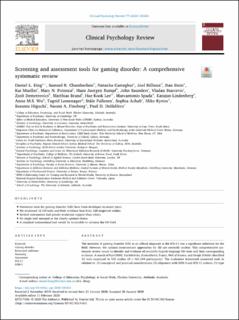| dc.contributor.author | King, Daniel L. | |
| dc.contributor.author | Chamberlain, Samuel R. | |
| dc.contributor.author | Carragher, Natacha | |
| dc.contributor.author | Billieux, Joël | |
| dc.contributor.author | Stein, Dan | |
| dc.contributor.author | Mueller, Kai | |
| dc.contributor.author | Potenza, Marc N. | |
| dc.contributor.author | Rumpf, Hans-Jürgen | |
| dc.contributor.author | Saunders, John | |
| dc.contributor.author | Starcevic, Vladan | |
| dc.contributor.author | Demetrovics, Zsolt | |
| dc.contributor.author | Brand, Matthias | |
| dc.contributor.author | Lee, Hae Kook | |
| dc.contributor.author | Spada, Marcantonio M. | |
| dc.contributor.author | Lindenberg, Katajun | |
| dc.contributor.author | Wu, Anise M.S. | |
| dc.contributor.author | Lemenager, Tagrid | |
| dc.contributor.author | Pallesen, Ståle | |
| dc.contributor.author | Achab, Sophia | |
| dc.contributor.author | Kyrios, Mike | |
| dc.contributor.author | Higuchi, Susumu | |
| dc.contributor.author | Fineberg, Naomi A. | |
| dc.contributor.author | Delfabbro, Paul H. | |
| dc.date.accessioned | 2021-07-01T09:01:52Z | |
| dc.date.available | 2021-07-01T09:01:52Z | |
| dc.date.created | 2020-11-10T11:56:20Z | |
| dc.date.issued | 2020 | |
| dc.Published | Clinical Psychology Review. 2020, 77 1-20. | |
| dc.identifier.issn | 0272-7358 | |
| dc.identifier.uri | https://hdl.handle.net/11250/2762724 | |
| dc.description.abstract | The inclusion of gaming disorder (GD) as an official diagnosis in the ICD-11 was a significant milestone for the field. However, the optimal measurement approaches for GD are currently unclear. This comprehensive systematic review aimed to identify and evaluate all available English-language GD tools and their corresponding evidence. A search of PsychINFO, PsychArticles, ScienceDirect, Scopus, Web of Science, and Google Scholar identified 32 tools employed in 320 studies (N = 462,249 participants). The evaluation framework examined tools in relation to: (1) conceptual and practical considerations; (2) alignment with DSM-5 and ICD-11 criteria; (3) type and quantity of studies and samples; and (4) psychometric properties. The evaluation showed that GD instrumentation has proliferated, with 2.5 tools, on average, published annually since 2013. Coverage of DSM-5 and ICD-11 criteria was inconsistent, especially for the criterion of continued use despite harm. Tools converge on the importance of screening for impaired control over gaming and functional impairment. Overall, no single tool was found to be clearly superior, but the AICA-Sgaming, GAS-7, IGDT-10, IGDS9-SF, and Lemmens IGD-9 scales had greater evidential support for their psychometric properties. The GD field would benefit from a standard international tool to identify gaming-related harms across the spectrum of maladaptive gaming behaviors. | en_US |
| dc.language.iso | eng | en_US |
| dc.publisher | Elsevier | en_US |
| dc.rights | Attribution-NonCommercial-NoDerivatives 4.0 Internasjonal | * |
| dc.rights.uri | http://creativecommons.org/licenses/by-nc-nd/4.0/deed.no | * |
| dc.title | Screening and assessment tools for gaming disorder: A comprehensive systematic review | en_US |
| dc.type | Journal article | en_US |
| dc.type | Peer reviewed | en_US |
| dc.description.version | publishedVersion | en_US |
| dc.rights.holder | Copyright 2020 The Authors | en_US |
| dc.source.articlenumber | 101831 | en_US |
| cristin.ispublished | true | |
| cristin.fulltext | original | |
| cristin.qualitycode | 1 | |
| dc.identifier.doi | 10.1016/j.cpr.2020.101831 | |
| dc.identifier.cristin | 1846513 | |
| dc.source.journal | Clinical Psychology Review | en_US |
| dc.source.40 | 77 | |
| dc.identifier.citation | Clinical Psychology Review. 2020, 77, 101831 | en_US |
| dc.source.volume | 77 | en_US |

